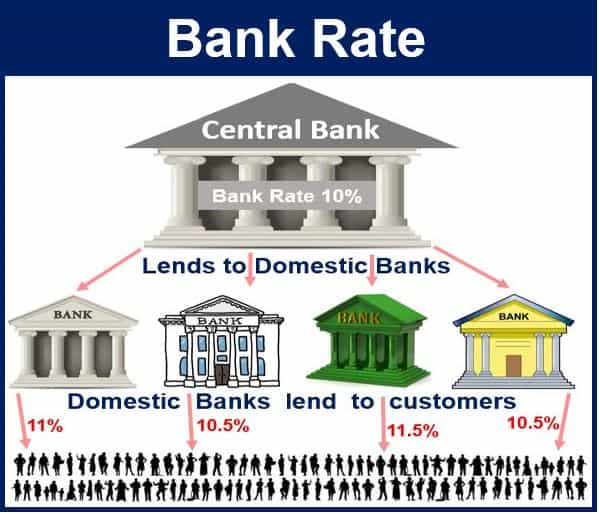What is the bank rate? Definition and meaning
The bank rate, base rate, or discount rate is the interest rate that the central bank charges on loans and advances to domestic banks. When the central bank lends money to commercial banks, it charges an interest rate. We call this interest rate the ‘bank rate’. Every bank bases its interest rates on the bank rate.
In the United States, the federal discount rate has the same meaning as the bank rate.
Whenever a bank is short of funds, it will borrow from the central bank. This is typically done via repos. The repo is the rate at which the central bank lends short-term money to commercial banks against securities.
When the repo rate declines, banks can borrow money at a cheaper rate. When it goes up, on the other hand, borrowing from the central bank becomes dearer.
According to InvestorGuide.com, the bank rate is:
“The discounted interest rate at which a central bank makes loans to a national bank.”

The reverse repo rate is the rate at which banks can place excess funds with the reserve bank.
Central banks require that their domestic banks maintain a certain percentage of their deposits in cash. We call this percentage the ‘reserve requirement.’
When a bank cannot meet the reserve requirement, it may borrow from other banks or the central bank.
These central bank loans are usually for very short periods, typically overnight.
Bank rate regulates the economy
Central banks can regulate the level of economic activity in a country. They do this by managing the bank rate.
For example, when the bank wants to boost the economy, it lowers the rate. Similarly, when unemployment is high, the central bank wants interest rates to go down.
Central banks will also reduce bank rates when company closures are increasing, and investment and borrowing levels are low.
On the other hand, when there are signs that the economy is overheating, it will try to cool things down. The central bank raises the bank rate when it wants to slow down the economy.
When inflation is too high, for example, it means that the economy is overheating.
Banks don’t like to borrow to meet reserve requirements when the bank rate is high. This causes them to build up reserves, and thus make fewer loans.
Conversely, when the rate falls the effect is the opposite; banks make more money available for lending.
The term ‘bank rate’ might also refer to the rates commercial banks charge their customers on loans.

